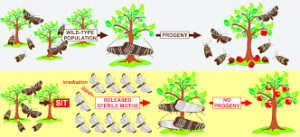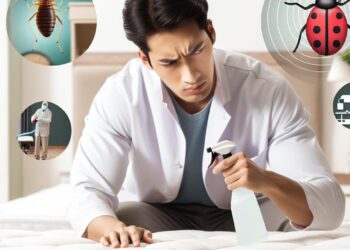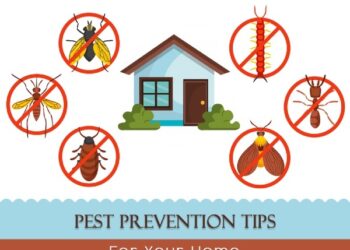Navigating the Ethics of Pest Control: Weighing the Use of Lethal Methods and Treating Animals with Respect
Pest control has been a necessary activity since ancient times, with various methods being used to control pests that threaten human health, crops, and property. However, the use of lethal methods in pest control has raised ethical concerns among animal rights activists and the general public. In this article, we will discuss the ethical considerations involved in pest control, including the use of lethal methods and the treatment of animals.
The Use of Lethal Methods in Pest Control
Lethal methods of pest control include the use of poisons, traps, and shooting. While these methods are effective in controlling pests, they raise ethical concerns as they can cause suffering and death to animals. Moreover, these methods may not discriminate between target and non-target species, leading to unintended consequences.

Poisons, for example, are often used to control rodents and insects. However, they can also poison other animals that consume the poisoned prey or bait. This includes birds of prey, cats, dogs, and even humans. Therefore, the use of poisons must be carefully regulated to minimize harm to non-target species.
Traps are another lethal method of pest control. They can cause physical harm and suffering to animals, particularly if the trap is not checked frequently. Some traps also cause a slow death, which can be considered inhumane. Shooting is also a lethal method used to control pests such as birds, rabbits, and foxes. However, it can cause unnecessary suffering if the animal is not killed instantly.
Non-Lethal Methods of Pest Control
Non-lethal methods of pest control include exclusion, repellents, and relocation. Exclusion involves sealing off entry points to prevent pests from entering buildings or structures. Repellents use natural or synthetic substances to repel pests. Relocation involves trapping and releasing pests in their natural habitat.
Non-lethal methods of pest control are considered more humane and ethical than lethal methods. However, they may not be effective in controlling large populations of pests. Moreover, some pests may be difficult to relocate or may pose a risk to human health if they are released into the wild.

Treatment of Animals
Animals used in pest control must be treated humanely and with respect. This includes providing adequate food, water, and shelter. Animals should also be handled with care to minimize stress and injury. Moreover, animals used in pest control should be trained to perform their tasks without causing unnecessary harm to themselves or other animals.
In some cases, animals used in pest control may be injured or killed during the process. Therefore, it is important to ensure that the benefits of using animals in pest control outweigh the costs. This requires careful consideration of the welfare of the animals, as well as the effectiveness of the method used.
Regulatory Framework
Pest control is regulated by various government bodies and organizations to ensure that it is carried out in a safe and humane manner. In the UK, the Animal Welfare Act 2006 sets out the legal requirements for animal welfare, including the treatment of animals used in pest control. The act requires that all animals are protected from pain, suffering, injury, and disease, and that they are able to express their normal behaviors.
Moreover, the UK government has set up the Campaign for Responsible Rodenticide Use (CRRU) to promote the responsible use of rodenticides. The campaign aims to reduce the amount of rodenticide residues in wildlife by promoting good practice among pest controllers and farmers. The CRRU Code of Best Practice provides guidance on the safe and effective use of rodenticides.
The Ethical Debate
The use of lethal methods in pest control has been a subject of ethical debate for many years. Animal rights activists argue that lethal methods are cruel and inhumane, and that non-lethal methods should be used instead. They also argue that animals have the right to live free from harm, and that pest control should be carried out in a way that minimizes harm to all animals, including non-target species.
On the other hand, supporters of lethal methods argue that they are necessary to control pests that pose a threat to human health, crops, and property. They argue that non-lethal methods are often less effective in controlling large populations of pests, and that they may not be practical or cost-effective in some situations. They also argue that animals used in pest control are trained to perform their tasks without causing unnecessary harm, and that their welfare is carefully considered.

The Way Forward
The ethical considerations involved in pest control are complex and require careful consideration. Pest controllers, farmers, and other stakeholders must balance the benefits of using lethal methods against the potential harm they may cause to non-target species. They must also consider the effectiveness of non-lethal methods, and the welfare of animals used in pest control.
To promote ethical pest control practices, the use of lethal methods should be regulated and monitored to ensure that they are used safely and effectively. Non-lethal methods should be promoted where possible, and research should be carried out to develop new and more effective non-lethal methods of pest control. Moreover, animals used in pest control should be trained and cared for in a way that minimizes harm and stress.
Reducing the Need for Pest Control
In addition to considering the ethical implications of pest control, it is important to consider ways in which the need for pest control can be reduced in the first place. There are many ways in which pests can be discouraged or prevented from entering an area, without resorting to lethal methods.
One approach is to use integrated pest management (IPM) techniques, which combine a range of different methods to control pests. These methods may include physical barriers, such as screens or nets, to prevent pests from entering an area, or cultural practices, such as crop rotation, to reduce the attractiveness of an area to pests. Biological control methods, such as introducing natural predators, can also be effective in controlling pest populations.
Another approach is to improve the conditions in which crops or animals are kept, in order to reduce the likelihood of pests being attracted to them. This may involve improving hygiene practices, such as regular cleaning and disinfection of animal housing, or providing appropriate waste management facilities to reduce the availability of food sources for pests.
By taking a proactive approach to pest management, it may be possible to reduce the need for more aggressive pest control measures, such as the use of lethal methods.
Conclusion
Pest control is a necessary activity, but it must be carried out with ethical considerations in mind. Lethal methods of pest control must be carefully regulated to minimize harm to non-target species. Non-lethal methods of pest control may be more humane, but they may not be effective in controlling large populations of pests. Animals used in pest control must be treated humanely and with respect, and their welfare must be carefully considered in any pest control program.














